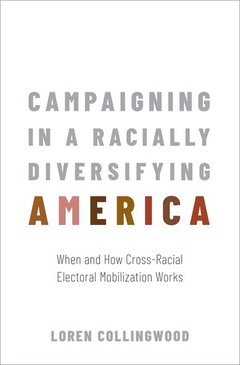Campaigning in a Racially Diversifying America When and How Cross-Racial Electoral Mobilization Works
Langue : Anglais
Auteur : Collingwood Loren

As the voting public continues to diversify across the United States, political candidates, and particularly white candidates, increasingly recognize the importance of making appeals to voters who do not look like themselves. As history has shown, this has been accomplished with varying degrees of success. During the 2016 election, for example, both Hillary Clinton and Bernie Sanders campaigned vociferously among Latino voters in Nevada's early primary, where nineteen percent of the Democratic caucus consisted of Latinos. Clinton released a campaign message to these voters stating that she was just like their abuela (or grandmother). The message, widely panned, came across as insincere, and Clinton, who otherwise performed well among Latinos nationally, lost by a wide margin to Sanders. On the other hand, in 2013, Bill de Blasio, campaigning for mayor of New York City, appeared with his black son in a commercial aimed against stop and frisk policies. His appeal came across as authentic, and he received a high level of support among black voters. In Campaigning in a Racially Diversifying America, Loren Collingwood develops a theory of Cross-Racial Electoral Mobilization (CRM) to explain why, when, and how candidates of one race or ethnicity act to mobilize voters of another race or ethnicity. Specifically, Collingwood examines how and when white candidates mobilize Latino voters, and why some candidates are more succesful than others. He argues that candidates strategize by weighing the potential costs and benefits of conducting CRM based on the size of the minority electorate (the benefit) and the overall level of white racial hostility (the cost). Extensive cross-racial mobilization is most likely to occur when elections are competitive, institutional barriers to the vote are low, candidates have previously developed a welcoming racial reputation with target voters, whites' attitudes are racially liberal, and the Latino electorate is large and growing. Moreover, candidates who can demonstrate cultural competence and do so repeatedly are much more likely to be successful at making such appeals. The book looks at CRM trends and case studies over the past seventy years to gauge how politics in various places have changed as the American electorate has diversified. It draws on the author's research in over thirty archives in nine states, candidate and survey data, and experimental approaches to assess causality in voter responses to candidate behavior.
Loren Collingwood is Associate Professor in the Department of Political Science at the University of California, Riverside. He is the co-author of Sanctuary Cities: The Politics of Refuge, and more than 26 journal articles. His research and teaching interests include American politics, political behavior, immigration, race and ethnic politics, and political methodology.
Date de parution : 03-2020
Ouvrage de 240 p.
23.9x15.5 cm
Thème de Campaigning in a Racially Diversifying America :
© 2024 LAVOISIER S.A.S.
